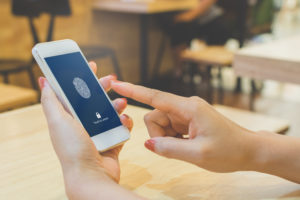It’s 2019, the year of technology… we hear it everywhere we go. As we embrace new technology, such as facial recognition mobile devices and 4D movies, it is important to remember and practice the basics of digital safety. While there are many benefits of using cell phones and other electronic devices, be aware that these same devices can become a gateway for thieves to steal personal and financial information, as well as identities. Keep reading to learn eight easy ways to protect your digital information.
1. Always Create Complex Passwords
It isn’t likely that your home computer will ever leave your home, but like all other digital devices and gadgets, it should always be protected with a password. Any device without a password that is lost, stolen, or breached will immediately become an easy way for internet hackers and thieves to steal your identity, but having a strong password can prevent this. While passwords are a great first step and safeguard in protecting your personal information, not all passwords are good passwords. The next sections will detail more about password making and safety.
2. Use Letters, Numbers and Special Characters
The next step is to use a strong, unique password for each of your devices and online accounts. The key words here are strong and unique. Include a mix of letters, numbers and special characters to make the password more complex.
Good Password: $mellyc@t
Bad Password: pinkjellyfish
3. Never Use the Same Password Twice!
You may be comfortable using the same username and password for every electronic account whether it be online banking, shopping, or social media, but doing so leaves the door open for identity theft on not just one, but all accounts. While it may be convenient and easy to remember, it is much safer for your identity and personal information to avoid using the same username and password across all websites and accounts.
4. Set Strong Security Questions
Security questions are often used as a secondary form of authentication within individual user accounts. When answering these questions, please be sure to use simple, strong, stable and easy-to-remember answers.
Example of good security question: “What is your oldest cousin’s first name?”
Example of bad security question: “What is your address?”
5. Change Your Passwords Regularly
It is recommended to change your password every 60-90 days. If you receive suspicious emails or notice any suspicious activity, it is recommended that you change your password immediately. If your password is not changed on a regular basis, your familiarity with your password will eventually lead to it’s compromise.
6. Protect Mobile Devices with a Lock Code

Whether your mobile device is left in a public restroom or fell out of your pocket during an Uber ride home, mobile devices are often subject to theft. The best and easiest way to ensure your phone’s return home is protecting your device with a lock code. This ensures that your information is safe or inaccessible until you are able to locate your device.
7. Consider Fingerprint or Facial Recognition access on mobile devices
Fingerprints and facial recognition are unique and specific to each individual. Adding this extra layer of authentication to your mobile device ensures that your personal, digital information has the most security and is as safe as possible.
8. Use Multiple Authentication Methods for Bank & Social Accounts
Whether it is getting into your mobile device or authenticating for different mobile applications, having multiple forms of authentication is the best way to ensure that your mobile apps that your account is safe as could be. Some common forms of multiple layer authentication would include security questions, two factor authentication via text or call, facial recognition, etc.
Another simple way to ensure that your digital information is safe is keeping everything written down at a secure location within your home. When working on your computer or on certain websites, keep an eye out for things like excessive pop-ups or unusual webpages. When using your mobile devices, ensure the software is to date and restart every once in a while… electronics needs sleep too!


 Pamela Maloney
Pamela Maloney